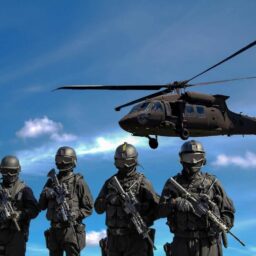Introduction
Taliban militia’s rise to power in Afghanistan has put governments throughout the world in a quagmire as to whether or not recognise a regime purporting to be Afghanistan’s new government. Russia and China, two of the permanent members of the United Nations Security Council, appear to be willing to recognise a Taliban-led government, but the European Union and nations like Canada are opposed to it. Consequently, questions crop up like: what is international law’s stand on recognising the Taliban-led government? Can it be recognised as a legitimate government? Can Afghanistan still be termed as a state under international law?[1]
When a state’s government changes, questions of recognition do not arise since political authority is transferred legally. However, things are different when a government is changed by extra-legal means, such as overthrowing the incumbent government through unconstitutional methods. A Government must get recognition under international law for a variety of reasons. It is critical to understand who the state’s ruling authority is, and who is responsible for effectively fulfilling domestic and international legal obligations like abiding by treaties, diplomatic relations, enjoyment of basic human rights etc.
difference between Recognition of Govt and Recognition of State
International legal studies are primarily centred around the recognition of states and their legal implications. However, the recognition of governments is an issue that receives less attention despite its political significance.
It’s important to realise that recognising the government is not the same as recognising the state under international law. James Crawford speaks about the government’s legal entity: “recognition of government and state may be closely related, they are not identical. Non-recognition of a particular regime is not necessarily a determination that the community represented by the regime does not qualify for statehood. Non-recognition of a government may mean that it is not regarded as a government in terms of independence and effectiveness or that the on recognizing state is unwilling to have normal intergovernmental relations with it (sic)”.[2]
Another well-known international lawyer, Malcolm Shaw, puts it: “a change in government, however, accomplished, does not affect the identity of the State itself.[3]” States that are occupied illegally or even in the hands of terrorists do not lose their statehood. As a result, despite the Taliban troops’ takeover, the state of Afghanistan retains its legal personality. It is necessary to emphasize that the Taliban will not create a new state. Its population and territory will stay the same as well. As a result, the current debate is not about recognizing Afghanistan, which already retains its legal personality.
Recognition: a political as well as a discretionary Act
According to the Arbitration Commission on Yugoslavia; “Recognition is a discretionary act which other states may perform when they choose and in the manner of their choosing subject only to respect for the guiding norms of general international law[4]“. A cursory examination of the policies of states around the world reveals that acts of recognition are both political and discretionary. As seen by China’s and Russia’s overtures, whether nations recognize the Taliban rule or not will be determined by their strategic, economic and political considerations.
Recognizing a government, on the other hand, may be required to ensure international law coherence and local political stability. However, in situations involving militia invasion, armed unrest, or a disputed election, international recognition of a government has a significant impact. Several theories and criteria have emerged in international law for resolving the question of official recognition, and they must be carefully examined.
Various criteria prescribed by international law
International law sets a set of well-defined requirements for recognising a newly formed state. The Article 1 of the Montevideo Convention of 1933[5] stipulates that a new state must have i) a permanent population; ii) a specified territory; iii) a government, and iv) the ability to engage in international affairs. This criterion was applied by various countries to grant recognition to Timor-Leste when it gained independence in 2002, as well as when other new states formed, like South Sudan. Even if a state has all of these necessary characteristics, it is not instantly recognised as a state. In addition to achieving all of the fundamental requirements stipulated in Article 1 of the Montevideo Convention, the takeover must be deemed lawful by the global community’s member states to have de jure legitimacy. This takes us to more contemporary tendencies in international law, in which regime legitimization appears to incorporate ‘democratic governance’ principles. However, the difficulty to identify any objective norms for recognition in the fragmented legal system of international law, as well as the frequent change of governments, has led to the emergence of many theories. Effectiveness theory and Democratic legitimacy theory are majorly taken into consideration.
- Effectiveness theory:
In international law, the ‘effectiveness’ test has traditionally been used to determine whether or not a new government should be recognized. Recognizing a government, according to this concept, entails determining whether it has effective authority over the state it governs. To put it another way, it involves determining if the government has effective control over the state’s territory (or a portion of it) and its population, public bodies, the banking and monetary system, and so on, with the likelihood of stability. The implicit assumption is that effective control implies that the citizens of the country approve and accept the new government; otherwise, it would be overturned. It makes no difference how the new administration took power under this concept (through militia invasion, armed unrest or civil war). Observing the situation of Afghanistan, it is evident that the government has influence over a vast majority of the population. Many people are struggling to flee Afghanistan, but this does not jeopardise the country’s basic stability. There is no doubt that the Taliban now have effective authority over Afghanistan’s territory which is evident from the fall of Panjshir Valley.
However, because the Taliban is made up of various sub-groups, strict application of effectiveness doctrines to identify Taliban control is difficult as the theory emphasizes the sustainability of power. The development of a Taliban resistance movement is the second issue that might hinder the strict application. Under this doctrine, however, there are no strong legal reasons to deny them recognition of their official existence.
- Democratic legitimacy theory:
Democratic legitimacy is a theory that competes with effective control doctrine. According to this doctrine, “recognition of a government also depends on whether it is the legitimate representative of the people it claims to govern[6]”. As a result, administrations that gain power by non-democratic means should not be recognised by nations, even if they have de facto control over the state. In the last three decades since the end of the Cold War, following the expansion of democracy around the world, and the rising need for universal protection of human rights has led this theory to gain significance.
As a result of this theory, several nations have granted de jure recognition (legal recognition) to governments in exile rather than governments in control. Let’s take two recent instances. First, since 2015, several nations have recognised Yemen’s Abdrabbuh Mansur Hadi’s government in exile, claiming that the dissident separatists gained control in Yemen through unlawful methods. Second, due to an apparent lack of democratic legitimacy the Nicolás Maduro’s government which controls Venezuela is not recognised by numerous nations.
Despite having strong authority over Afghanistan, the Taliban government lacks democratic legitimacy. As a result, countries may invoke the theory of democratic legitimacy to deny the Taliban de jure recognition.
However, whenever a new leader comes to power in China or North Korea despite the lack of democratic legitimacy, the legitimacy of their government is never questioned. Hence governments are not legally bound to refuse to recognize the Taliban because it lacks democratic legitimacy. As a result, if Russia and China publicly recognized the Taliban government as the legitimate rulers of Afghanistan because of the effective control it exercises, they would be acting per international law.
A Way Out
In light of the foregoing debate, it is reasonable to conclude that the Taliban government need international legitimacy for geopolitical and strategic reasons. At the same time, international law allows for the recognition of the Taliban government. Recognizing the Taliban as Afghanistan’s government opens up new possibilities for accountability. Diplomatic engagement, such as providing an enabling environment for diplomats, delegates of international organizations and human rights activists to carry out their projects and infrastructural development is also enabled. This would also bind the regime to commitments to human rights protection and anti-terrorism.
Likewise, by recognising the Taliban as the government of Afghanistan under Article 10(1) of the Articles on State Responsibility[7], the Taliban’s activities are attributed to the State of Afghanistan, establishing a framework for international legal responsibility to be carried by it. This implies it may now be prosecuted for violations of customary human rights law, humanitarian law, and terrorism sponsorship. As a result, in today’s globalised world, a policy of international diplomatic engagement with nations like Afghanistan and North Korea has become a necessity.[8]
Author(s) Name: Vaishnavi Chandrakar (Hidayatullah National Law University, Raipur)
References:
[1] Rothwell D, ‘What’s In A Name? The Taliban And Recognition Under International Law’ (Lowyinstitute.org, 2021) <https://www.lowyinstitute.org/the-interpreter/what-s-name-taliban-and-recognition-under-international-law> accessed 19 September 2021
[2] ‘Recognizing States: International Society And The Establishment Of New States Since 1776 – PDF Free Download’ (epdf.pub, 2021) <https://epdf.pub/recognizing-states-international-society-and-the-establishment-of-new-states-sin.html> accessed 20 September 2021
[3] Rajan P, ‘The Legal Challenges In Recognising The Taliban’ (The Hindu, 2021) <https://www.thehindu.com/opinion/op-ed/the-legal-challenges-in-recognising-the-taliban/article36087236.ece> accessed 21 September 2021
[4] Yadav G, ‘Recognising Taliban Rule?: Tale Of Two Theories In International Law’ (Livelaw.in, 2021) <https://www.livelaw.in/columns/international-law-afghanistan-taliban-rule-181760> accessed 21 September 2021
[5] ‘Montevideo Convention On The Rights And Duties Of States – The Faculty Of Law’ (Jus.uio.no, 2021) <https://www.jus.uio.no/english/services/library/treaties/01/1-02/rights-duties-states.xml> accessed 19 September 2021
[6] Anderson S, ‘History And The Recognition Of The Taliban’ (Lawfare, 2021) <https://www.lawfareblog.com/history-and-recognition-taliban> accessed 24 September 2021
[7] International Law Commission, ‘Articles on State Responsibility | How Does Law Protect In War? – Online Casebook’ (Casebook.icrc.org, 2021) <https://casebook.icrc.org/case-study/international-law-commission-articles-state-responsibility> accessed 20 September 2021
[8] Ahmad N, ‘Taliban Govt: What Does International Law Say About Recognising It?’ (TheQuint, 2021) <https://www.thequint.com/voices/opinion/taliban-govt-what-does-international-law-say-about-recognising-it> accessed 19 September 2021








